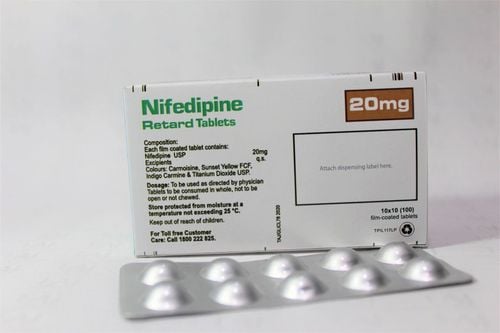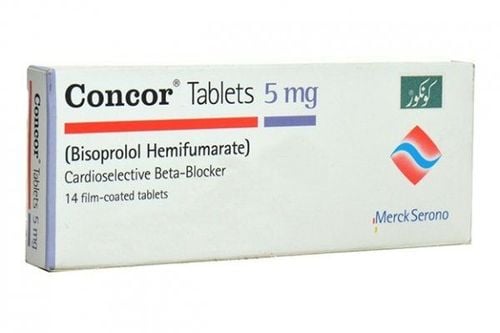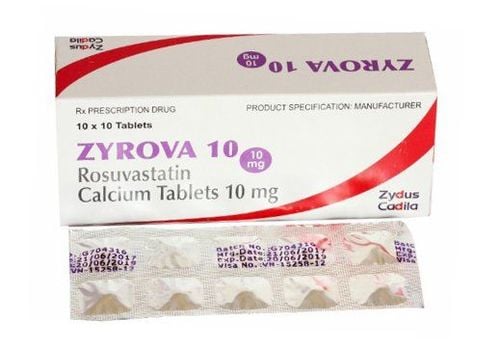This is an automatically translated article.
Article by Pharmacist, Master Pham Thi Kim Dung - Faculty of Pharmacy - Vinmec Times City International Hospital
Coronary heart disease is one of the most common cardiovascular diseases. It is one of the leading causes of death in the world. Treatment of coronary heart disease requires compliance with the treatment regimen. Using Colchicine in the treatment of coronary heart disease is also a method often prescribed by doctors.
1. What is Colchicine?
Colchicine is an old drug with anti-inflammatory properties that has been widely used in the treatment of gout or pericarditis. In recent years, with new scientific evidence, colchicine promises to become a combination drug to reduce the risk of recurrent cardiovascular events such as myocardial infarction and stroke.2. Colchicine's role in the treatment of coronary artery disease
Inflammation plays a key role in the development and progression of coronary artery disease. Experimental studies have demonstrated that inflammatory cells release specific enzymes and cytokines that promote erosion and rupture of atherosclerotic plaques, which are the main mechanisms underlying cardiovascular events.
With anti-inflammatory properties by inhibiting leukocyte function, inhibiting the release of inflammatory substances and activating the inflammatory response, over the past 3 decades, Colchicine has been studied to find out its benefits in the treatment of vascular disease. acute and chronic coronary. However, the available data are conflicting and it is not clear that the benefits outweigh the potential risks of adverse effects. In 2019 and 2020, 5 new clinical trials evaluating the benefits of colchicine in patients at high cardiovascular risk were conducted. The two largest clinical studies COLCOT (2019) and LoDoCo 2 (2020) provided positive evidence for the benefit and safety of low-dose colchicine in patients with coronary artery disease.
The COLCOT trial enrolled patients with myocardial infarction within 1 month prior to the study. The LoDoCo 2 trial enrolled patients with coronary artery disease who were clinically stable for at least 6 months.
Results of the COLCOT trial on 4745 patients showed that compared with the group not taking. The group of patients receiving colchicine had a 1.6% reduction in absolute risk across the composite endpoint of cardiovascular death, cardiac arrest, myocardial infarction, stroke, or urgent hospitalization for angina requiring coronary revascularization. In which, the use of Colchicine significantly reduced the rate of stroke (0.6%) and the rate of angina requiring coronary revascularization (1%).
The results of the LoDoCo 2 trial on 5522 patients showed that compared with the group not taking Colchicine, the group of patients receiving Colchicine had a 2.8% reduction in absolute risk on the composite endpoint including cardiovascular death and spontaneous myocardial infarction. , cerebral infarction, or the need for coronary revascularization.
After these two large studies were completed, the authors Kofler et al. conducted a systematic review and meta-analysis of 13 clinical trials from 1992 to 2020. The authors emphasized the benefits of colchicine in reduced rates of myocardial infarction, stroke and the need for coronary revascularization through pooled data. However, from the current data, cardiovascular mortality in the colchicine group does not appear to have improved. At the same time, the optimal dose level of Colchicine, the optimal length of treatment and the group of patients to benefit most are not really clear. The authors also suggest that a course of >30 days may be needed to see benefits, which is also consistent for colchicine to exhibit its full anti-inflammatory properties. A secondary analysis from the COLCOT trial suggested that colchicine should be used early in the hospital setting, within 3 days of myocardial infarction or coronary intervention.
The ongoing CLEAR-SYNERGY study with a 5-year follow-up goal of 7000 patients is expected to clear up any uncertainties on this topic.
3. Which patients should not use Colchicine?
Adverse effects of Colchicine commonly reported in clinical trials include diarrhea, muscle and hematologic side effects. Non-cardiovascular mortality tended to be higher in the colchicine group when data from trial studies were pooled. Clearly, despite the optimistic signals from new clinical trials, caution in prescribing Colchicine to patients with coronary artery disease is still necessary.
Patients after myocardial infarction and coronary revascularization should not self-administer or be routinely prescribed colchicine without adequate evaluation and consideration. Standard treatment regimens after myocardial infarction or coronary intervention still need to be followed to the maximum.
Study LoDoCo 2 excluded patients with moderate to severe renal impairment (eGFR<30ml/min), severe heart failure, severe valvular stenosis, or ever experienced adverse effects from colchicine. Study COLCOT excluded patients with severe heart failure, left ventricular ejection fraction <35%, stroke within 3 months, history of or planned coronary bypass surgery, history of cancer within 3 years, proctitis or chronic diarrhea, neuromuscular disease or CK index > 3 times the upper limit (except for causes of infarction), clinically significant hematologic abnormalities, functional impairment severe renal impairment, alcoholism, a history of or chronic corticosteroid use, or a history of hypersensitivity to colchicine.
This means that the benefit of the study cannot be extrapolated to these patient populations or that the risk of adverse effects will outweigh the actual benefits.
Although Colchicine is an inexpensive and fairly common drug, patients should not self-administer Colchicine unless indicated. Drugs can have adverse effects on health, even if not handled promptly, can be life-threatening, especially when the patient uses a dose that is not suitable for his body or has drug interactions.
4. What should patients pay attention to when prescribed Colchicine in coronary artery disease?
You need to discuss with your doctor your medical history and medications you are taking at home before admission to ensure optimal and safe prescriptions. Especially the history of liver and kidney disease, hematologic disease, history of serious side effects with Colchicine. Colchicine should only be used when prescribed and should be used in the correct dose as prescribed. The use of high doses may not add to the benefit of secondary cardiovascular event prevention and may cause undue adverse effects. Drugs can interact with many heart medications and other medications, so talk to your doctor about any additional medications, including over-the-counter medications and vitamins. Do not arbitrarily change blood lipids without consulting your doctor. Medicines can affect male fertility, you may need more advice when planning to have children if you are prescribed medication. The drug can cross the placenta and breast milk, you can talk to your doctor to understand the benefits and risks of the drug during pregnancy and breast-feeding before using it. Patients need to go to the nearest medical facility for timely examination and treatment if there are manifestations of hypersensitivity reactions (allergy; redness, itching, peeling of the skin; difficulty breathing, swelling of the face and tongue). ..); severe diarrhea; muscle pain; Oliguria or anuria. The drug can affect blood cells.
Please dial HOTLINE for more information or register for an appointment HERE. Download MyVinmec app to make appointments faster and to manage your bookings easily.














